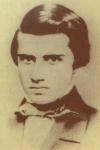Biography
Manuel Antônio Álvares de Azevedo was a Brazilian Romantic poet, short story writer, playwright and essayist. Adept of what was called in Brazil "Ultra-Romanticism", his work is characterized by heavy dualism and morbidity, what gave him the epithet of "the Brazilian Lord Byron". He is the patron of the second chair of the Brazilian Academy of Letters, and of the ninth chair of the Paulista Academy of Letters.
Biography
Azevedo was born into a wealthy family in São Paulo City, on September 12, 1831. Son of Law student Inácio Manuel Álvares de Azevedo and Maria Luísa Azevedo (née Mota), a popular belief says that he was born in the library of the Faculdade de Direito da Universidade de São Paulo, but he was actually born on the farmhouse of his maternal grandfather, Severo Mota. He also had a younger brother, Inácio Manuel, Jr., but he died prematurely in 1835. Álvares grew very shocked and appalled to this happening. In 1833, Álvares moved alongside his family to the city of Rio de Janeiro, and in 1840 he entered the Colégio Stoll in the bairro of Botafogo, being an excellent student. Álvares de Azevedo influenced by Lord Byron, Alfred de Musset, François-René de Chateaubriand,Alphonse de Lamartine, Heinrich Heine, William Shakespeare, Dante Alighieri, Johann Wolfgang von Goethe, Thomas Chatterton and José Bonifácio the Young.
In 1844, he temporarily returns to São Paulo alongside his uncle, returning to Rio in the following year, where he ingressed the Colégio Pedro II. Having graduated in 1846 of the Colégio Pedro II, he entered the Faculdade de Direito da Universidade de São Paulo in the following year, where he befriended the also poets José Bonifácio the Young (the step-grandson of famous Brazilian statesman José Bonifácio de Andrada e Silva), Aureliano Lessa and Bernardo Guimarães. Along with those, he founded the mythical "Sociedade Epicureia" ("Epicurean Society"), a club that promoted Epicureanism and Bohemianism as lifestyles, and he also planned a work in partnership with Lessa and Guimarães, the poetry book As Três Liras (in English: The Three Lyres) ? however, the project did not come to fruition. The only remaining part of the project today is the book Lira dos Vinte Anos. Because of his fragile health and due to the murky weather of São Paulo, Azevedo got tuberculosis. Having quit his Law course and moving to his grandfather's farm in Rio in order to mitigate his disease, there he fell from a horse and contracted a gastric inflammation that made him die with only 20 years old on April 25, 1852. He was buried one day later at the Cemitério São João Batista. ..






